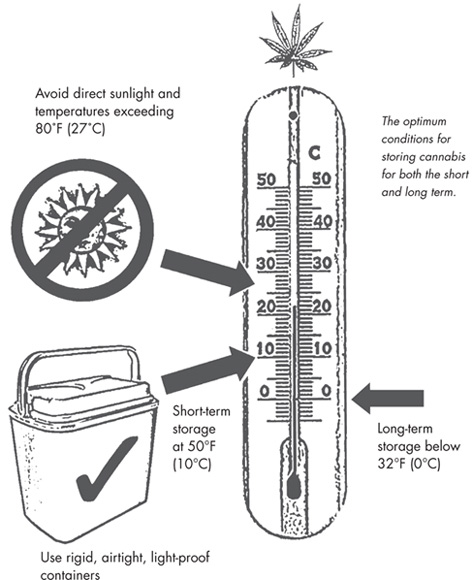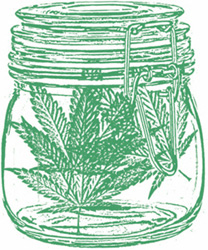Whether you have dried flowers, pressed hash, tinctures, oils, waxes, or creams, there are a number of effective methods for storing cannabis, all of which serve to protect and preserve it for the longest possible time. As with all natural products, cannabis is susceptible to damage from exposure to heat, air, moisture, and light, so it pays to make the right choices for the longer term. Depending on the form being stored—particularly in the case of flowers—cannabis may also suffer from bruising and cross-contamination. To keep cannabis flowers and extracts in good condition, store them in a dark and cool place in an airtight, rigid container. For storage of fewer than 90 days, temperatures around 50°F (10°C) will maintain quality. At this temperature, 55 percent humidity should keep the cannabis from deteriorating. For long-term storage of flowers, however, a temperature below freezing is recommended—and the colder the better, though frozen flowers should not be thawed and refrozen. Cannabis should never be kept in temperatures over 80°F (27°C), neither should it be transported in a hot and confined space—such as a glove box or truck—except when stored in a chilled, well-insulated container. A lot of cannabis gets ruined by relatively short exposure to high heat in automobiles. Plastic sandwich bags are often used by drug dealers to package cannabis for selling. This leads to rapid bruising and deterioration of the cannabis. Keeping medical cannabis in good condition for a longer time requires a more robust approach to packaging. Plastics such as polyethylene and polypropylene are good choices for containers storing cannabis. The key to choosing a good storage medium for cannabis is its chemical resistance. Anything that is considered safe for food storage and marked with NSF (certification from NSF International as being certified for food storage) is a safe bet. You can reuse containers to hold cannabis flowers and extractions, but always clean them out between uses. To avoid the possibility of cross-contamination, wash previously used containers thoroughly with soap and hot water. Never store cannabis in a dirty container. Remove cannabis resin buildup on used containers with 91 percent isopropyl alcohol, then rinse with hot water and allow to dry completely before use. If the used container is still even slightly sticky with resin, it’s not clean. Glass jars offer one of the best methods for storing dried cannabis. They must be perfectly clean with airtight lids. Sandwich and Turkey Bags Some medical cannabis dispensaries in California use soft plastic bags to package dried flowers and some extractions. The issue with this soft type of plastic is that a few of the oils produced by the cannabis plant, such as limonene, can dissolve the plastic and deposit its residue on the remaining cannabis. You really don’t want to consume plastic-soaked cannabis. Oven-safe bags are a much better choice for soft packaging of cannabis. Cannabis cultivators often choose turkey-sized oven bags to store up to a few pounds of dried cannabis.
STORING CANNABIS
Cannabis is Perishable

Chemical-Resistant Plastic or Glass

< div class='tao-gold-member'>
Cannabis
Only gold members can continue reading. Log In or Register to continue

Full access? Get Clinical Tree



